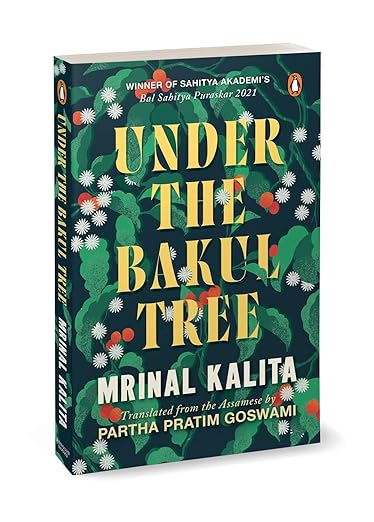Under the Bakul Tree by Dr Mrinal Kalita, translated by Partha Pratim Goswami
My take on the book:
In a quaint village in Assam, Ashim a tenth-class student decided to drop off from school owing to family issues. His father who was once very loving towards him and his small sister Ajoli has recently become a drunkard, which disrupted the peace at home. His father would often snatch the meagre earnings from his mother and if objected would beat her. To help his mother financially, Ashim voluntarily dropped out of school to break rock boulders at a nearby quarry.
Even before he dropped out of school, Ashim who was once the class topper, slipped to the last place in the class in the past few years, as he was unable to concentrate on his studies. He was constantly scolded and punished by his teachers that he is neglecting his studies, which became a catalyst for his decision to leave school. Though his mother wanted him to continue studies, she did not have the strength to force him back to school.
There is only one person who was sad about Ashim’s decision and desperately wanted him to return to school — Nirmal, Ashim’s classmate. Though Nirmal and Ashim competed for the first rank in their class few years back, Nirmal is the only person who right now honestly cared for Ashim. The one instance Ashim returned to school on Nirmal’s insistence, he was again humiliated by his teacher, forcing him to run away from school forever, leaving Nirmal guilty.
Will Nirmal ever be able to convince Ashim to come back to school, will Ashim be able to cope with his family issues and continue his studies forms the rest of the story.
The story depicts the situations faced by families living in abject poverty, especially in rural areas where the avenues for earning are limited and whose social and financial situation further worsens when the earning members of the family are addicted to substance abuse. In parallel, the story also highlights the multiple problems with current education system, especially how the rude and cruel behavior of teachers affects the students’ psyche.
The impact of abusive parents and an unhappy household on young kids is also well depicted by the author. The metaphor that Ashim thinks for the mountain and his own family’s happiness is very intense but real. The teachers who assume they are being strict with students and those who work for their students’ welfare and progress, is well contrasted by the author.
Though this is a translation, the translator has done a superb job that it is hard to believe this is not a straight English piece. There are places where the pace slows down, also since the topic is a serious one, the story requires your complete attention.
Pick this one to read about childhood friendships, and realistic struggles faced by students in rural India.
My rating:
4/5.
